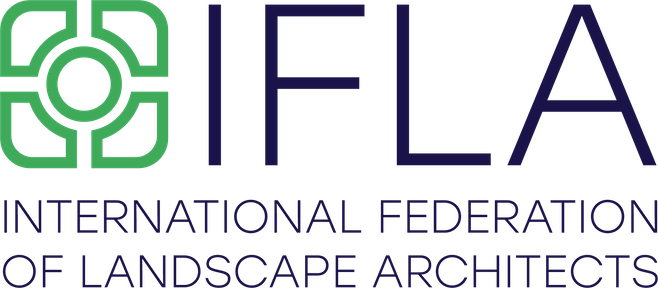IFLA World and APR Congress 2022 in Gwangju
The three-day congress of IFLA World and APR Congress 2022 in Gwangju opened with the Pre-Congress lecture of Keunsik Jeong on the Cold War landscape. Followed by the opening remarks of IFLA President James Hayter and the Chairman of the 58th IFLA World Congress Organizing Committee Kyung-Jin Zoh, the camera turned to a student from Seoul National University on the center stage, who represented the younger generation of landscape architects, and spoke on what landscape design means to her and what the future of landscape design holds. A short film followed the student’s speech. Unlike the promotional video released earlier, this one started with interviews with children about what they thought of landscape design, both in writing and in voice. The music quickly turned intense as the images shown on the screen became those of catastrophes and disasters that we encountered in recent years. Following along with the drum beats came the sub-themes this year, RE:VISIT, RE:SHAPE, RE:VIVE AND RE:CONNECT.
Quoted from the pamphlet of IFLA World Congress Gwangju 2022, “Through this event, we will reclaim public leadership in landscape architecture as we re:visit professional and academic achievements to date, re:shape the earth through emerging discourse and technologies, re:vive everyday lives to healthier and more vibrant ways, and finally re:connect to nature.”


The theme of RE:PUBLIC and the the sub-themes were well organized in the keynote speeches. On the first day Craig Pocock of Beca Group was on sustainable innovation and carbon. Craig’s speech encouraged the landscape design industry to really explore what a sustainable landscape should be, not only in the aspect of design, but in management, maintenance and construction as well.
On the morning of the second day, the keynote speakers included Ah-Yeon Kim from the University of Seoul and Catherine Nagel from City Parks Alliance. Ah-Yeon Kim spoke of her remarkable and inspiring landscape designs, especially how the traditions of Korea were put into play to create such profound and meaningful yet contemporary landscape and art installations. Catherine Nagel traced back from the creation of Central Park of NYC, back then, nowadays, and in the future how the landscape architects lead the public through troubled eras such as the COVID pandemic.
Jungyoon Kim from Harvard GSD led the third day’s keynote speech. Her works demonstrated that landscape design can be elegant and exquisite while confronting the climate crisis. Jillian Wallis from the University of Melbourne and Heike Rahmann from RMIT University delivered the second keynote speech based on the book titled “The Big Asian Book of Landscape Architecture.” They encouraged the Asian landscape designer to look into their roots of cultures and be proud of their heritages; more and more good landscape designs in Asia should be promoted and to be known by the world.

The special session in Day One was the AURI Special Session that invited Jeff Hou from the University of Washington, Sohyun Park from the University of Connecticut, and Eunseok Lee from AURI, the Architecture and Urban Research Institute. Each of them delivered short speeches on a post-pandemic urban(park) agenda, endangered biodiversity nowadays, and how to use green infrastructure to improve the resilience of cities in the climate crisis era. After the three short speeches was the panel discussion. Under the topic “Urban Park and Public Space after Global Climate Change and the Pandemic”, the landscape architects on stage discussed ideas and methods on how to create sustainable public space in urban environment.
Day Two afternoon was the CHA Special Session by the Cultural Heritage Administration to “share operational methods and various opinions and discussions for protecting and managing historic gardens. In addition, [they] plan to explore the extent to which interventions for historic garden conservation can be applied in the context of climate change and sustainability.”

KILA delivered a successful congress meeting to remind landscape architects yet again how important our roles are to lead the public and how we should look into the future to confront the pandemics and crisis back to our roots and traditions. But an event like this was also where we meet our old acquaintances and make new friends. Overall there were more than five hundred representatives and students attending physically in this difficult time of pandemic. Representatives from Korea, Japan, Thailand, Singapore, New Zealand and Australia sat in the APR Regional Council Meeting with more than twenty delegates virtually attending. Opinions exchanged and friendships strengthened, we are all looking forwards to the IFLA APR Congress 2023 in Tokyo.
Matt Chu, CTLAS

